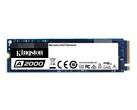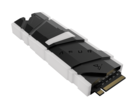Samsung SSD 970 Evo Review
Technically, the new SSD is based on the newest generation of V-NAND. To explain it simply, the storage cells are stacked on top of each other, which allows for a higher storage capacity in the same area and therefore (indirectly) a lower price. Moreover, each cell stores 3 bits, while Samsung uses NAND with 2 bits per cell in the Pro models.
A new Phoenix controller is supposed to ensure a high speed for the Evo model, and there are also an integrated DRAM cache and a pseudo-SLC cache. Both methods have been implemented for years and enable much higher data rates than without the caches, but only for a certain amount of data. The SSD 970 Evo is appropriately connected via four PCIe 3.0 lanes, and the NVMe 1.3 protocol is used for data transfer.
Benchmarks
This brief test uses the two extremely popular CrystalDiskMark and AS SSD benchmark applications to evaluate the speed of the new SSD 970 Evo. Since both these benchmark tools are basically synthetic, the achieved results don't necessarily allow us to draw conclusions for the behavior of the SSD in daily usage - although realistically, it is not about subjectively noticeable differences in SSDs anymore, and even extensive benchmark suites that want to quantify the real speed advantage of an SSD often deliver results that show hardly any differences.
Unfortunately, the results are only to a limited extent comparable to our older SSD tests. The reason for this is the current patches for the Spectre and Meltdown security issues. Even though the measured performance drops are supposed to be primarily limited to some particular write scenarios, a completely reliable comparison is not a given anymore. As a current reference which is quite comparable in terms of its price, we are using the Intel 760p in this test, which also has 3D-TLC storage and a PCIe 3.0 connection with four lanes.
CrystalDiskMark
The SSD 970 Evo has no trouble at all beating the Intel SSD 760p in CrystalDiskMark, at least in terms of sequential data transfers. At 970 MB/s, the Evo is 500 MB/s faster than the Intel competitor while reading and almost twice as fast while writing. While the advantage is still identical during accidental loads at a query depth and thread count of eight, the SSD 760p is able to surpass the 970 Evo during accidental loads with a query depth of one, particularly while reading.
The estimation of the endurance performance (nine times writing of 2 and 32 GB with a five-second break in between) measured using CrystalDiskMark shows that the 970 Evo is able to also maintain its high, sequential speed, while the Intel SSD 760p is unable to do this. Compared to the Samsung 960 Evo, there is a speed advantage of about 5% according to our tests if you consider only the sequential data transfer.
AS SSD
As expected, the completely synthetic benchmark of AS SSD confirms the excellent picture of the Samsung SSD 970 Evo. However, the copy test also shows that the Intel model can keep up very well when transferring rather small data amounts. When the amount of data to be transferred becomes larger, the picture changes, and the SSD 970 Evo clearly beats the Intel model.
| CrystalDiskMark 5.2 / 6 | |
| Write 4K | |
| Intel SSD 760p (256 GByte) | |
| Samsung SSD 970 Evo (500 GByte) | |
| Read 4K | |
| Intel SSD 760p (256 GByte) | |
| Samsung SSD 970 Evo (500 GByte) | |
| Write 4K Q32T1 | |
| Intel SSD 760p (256 GByte) | |
| Samsung SSD 970 Evo (500 GByte) | |
| Read 4K Q32T1 | |
| Samsung SSD 970 Evo (500 GByte) | |
| Intel SSD 760p (256 GByte) | |
| Write Seq Q32T1 | |
| Samsung SSD 970 Evo (500 GByte) | |
| Intel SSD 760p (256 GByte) | |
| Read Seq Q32T1 | |
| Samsung SSD 970 Evo (500 GByte) | |
| Intel SSD 760p (256 GByte) | |
| Write 4K Q8T8 | |
| Samsung SSD 970 Evo (500 GByte) | |
| Intel SSD 760p (256 GByte) | |
| Read 4K Q8T8 | |
| Samsung SSD 970 Evo (500 GByte) | |
| Intel SSD 760p (256 GByte) | |
Verdict
The SSD 970 Evo is the fastest M.2 SSD we have tested so far. At currently about 100 Euros (~$117; $108 in the US), the price for the 250 GB version is appropriate. The larger SATA SSD 850 Evo which is much slower in every respect costs only 20 Euros (~$23) less. The price of the 970 Evo is almost identical to that of the Intel SSD 760p, causing us to definitely recommend the Samsung model to potential buyers.
At the same time, the test also shows that the times of the large performance jumps in terms of SSDs are now over even in the synthetic benchmarks at this point, and even the four lanes of the PCIe-3.0 standard are at least sequentially almost fully used now. At least, this also means that owners of a high-performance SSD do not need to upgrade at all.
Test System
For the test, we used an XMG Apex 15 provided by Schenker, which we already tested. All the tests were performed using an M.2 slot which was connected via four PCIe-Express 3.0 lanes. For the first time, we used the Windows 10 Home version that was current as of May 1. We also used version 6.0.0 (64x) of CrystalDiskMark and version 2.0.6694.23026 of the AS SSD benchmark.








